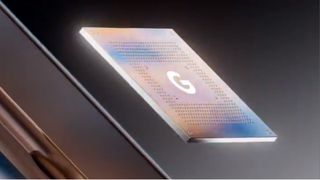Google Pixel 6 leak hints at how well its key component will perform
Samsung is heavily involved

Google's custom-made Tensor processor is going to be at the heart of the Pixel 6 and Pixel 6 Pro smartphones, and we now have a pretty major clue about its performance level – as well as just how much Samsung has contributed to the component.
According to some digging done by GalaxyClub, the Whitechapel codename for the Tensor CPU matches up with an unreleased Samsung Exynos chip, the Exynos 9855. It looks like the Tensor chip and the Exynos 9855 could be one and the same.
We'll have to find out to know for sure, but if that is the case then it sounds like Samsung and Google have been working together on the Tensor/Exynos 9855 processor from the very beginning, and that Samsung is much more involved than previously thought.
- Updates on the Pixel 6 cameras
- Android 12 news and features
- Details on the Google Pixel 6
Flagship-level performance
We've heard about the Exynos 9855 before, but it has never appeared in a device. Based on the information we've got, it looks as though the processor will be mid-way between the CPUs used in the Galaxy S21 and the Galaxy S22 in terms of its speed.
That would make sense from a timing perspective as well, as the Pixel 6 and Pixel 6 Pro are being launched between the two Galaxy flagships. The expectation is that the performance level will be closer to the Galaxy S21 than the Galaxy S22, which isn't due until the start of next year.
It remains to be seen what extra tweaks or innovations Google might have added to the Samsung Exynos base, but it sounds as though it's going to be able to compete with the best phones of the moment in terms of raw speed.
Analysis: a lot depends on the Tensor chipset

We're expecting some decent cameras, top-notch screens and speedy charging from the Pixel 6 phones, but the Tensor chipset is going to be crucial to their capabilities and their overall success. It's vital that Google (in association with Samsung) has got the processor right.
Get daily insight, inspiration and deals in your inbox
Get the hottest deals available in your inbox plus news, reviews, opinion, analysis and more from the TechRadar team.
From the very start, the Pixel series has set itself apart through the added artificial intelligence magic that Google is able to sprinkle on its devices – whether that involves superior on-device photo processing or the ability to recognize your voice in a crowd even when you're mumbling and indistinct.
With the Pixel 6 devices and their Tensor chips, the integrated AI power should go up another level. It should mean that more processing gets done on the actual phones themselves, without relying on Google's servers in the sky, which will again speed up overall performance.
It should also mean that the Pixel 6 devices are the perfect showcases for everything that Android 12 has to offer, whether that's Google Assistant or proactive protection against security threats. In short, the Pixel 6 and Pixel 6 Pro should represent Google's ideal of what a smartphone can be.

Dave is a freelance tech journalist who has been writing about gadgets, apps and the web for more than two decades. Based out of Stockport, England, on TechRadar you'll find him covering news, features and reviews, particularly for phones, tablets and wearables. Working to ensure our breaking news coverage is the best in the business over weekends, David also has bylines at Gizmodo, T3, PopSci and a few other places besides, as well as being many years editing the likes of PC Explorer and The Hardware Handbook.
Most Popular

